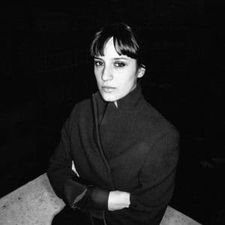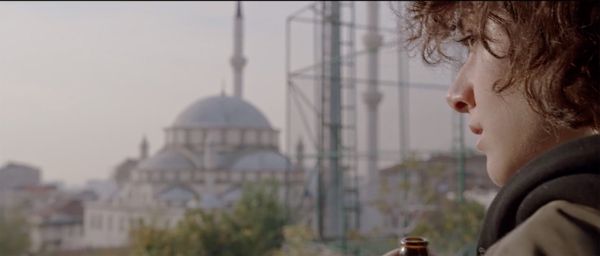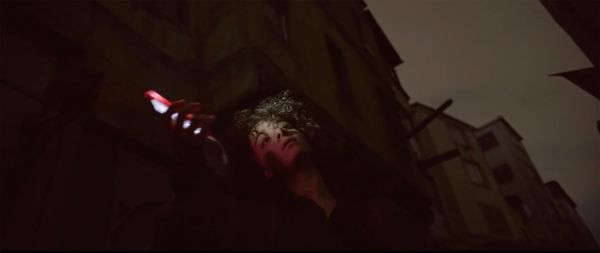 |
| Director Azra Deniz Okyay: 'As a director you should observe people in detail before writing about them' Photo: Courtesy of Venice Critics Week |
Azra Deniz Okyay makes her feature film debut in Venice Critics Week this year with Ghosts, a film that builds a multi-layered picture of modern-day Istanbul through its portrait of four people's lives that intersect - dancer Didem (Dilayda Günes), an older woman, Iffet (Nalan Kuruçim) trying to get cash together for her incarcerated son, protester Ela (Beril Kayar) and middle man Rasit (Emrah Ozdemir). The film has a punk energy that feels optimistic even as the clash between the bright promise of a gentrified Turkey comes up against the sharp reality for those at ground level in the country's capital. We caught up with the director via email to chat about the film.
You say in your director's statement that Ghosts "became your own rebellion". It felt as though its punk energy emerged and became stronger as the film progressed, did you feel that way as you were making it and can you tell us a bit about how the film evolved from your original idea.
Azra Deniz Okyay: From the very first seeds of this project, I brought together different characters with different walks of life into my script. I worked very hard on this equation. That’s why it has this energy. Both in scriptwriting and in shooting, I maintained this dynamic in my mind. So it was very intentional and in the editing, we found a rhythm accelerating towards the end. So I’m very glad that it is transferred in the film.
You play around with time and perspective in the film, allowing the stories to overlap, was that something you had in mind from the start or did it develop as the film came together.
ADO: I wrote the film like a hand-woven carpet. It was so complicated to work sometimes on the script because every little detail creates a domino effect for the other characters or the movement of the film. We decided to work with Ayris Alptekin, a really talented editor, even before the shooting. We were testing the mathematics and the dynamics of each scene against one another. So it was planned very early on in the process.
You've worked in documentary as well before this. Did your work in factual film influence or affect the way you shot this feature?
ADO: As a director you should observe people in detail before writing about them. Making a documentary helped me observe and film people without exploiting them. It actually inspired me to create the style of Ghosts where you follow characters very closely.
The film is, in part, about the way that people watch and scrutinise one another, as epitomised by your use of mobile phone footage at key moments. Do you feel there is a surveillance aspect to society now - that we've all become voyeurs, perhaps in part thanks to the mobile phone - and are there specific implications for this in Turkey?
ADO: Exactly. I feel like we are always under surveillance. I used this in two approaches in my film. First, Rasit is someone who wants to be a part of the status quo, and he is always “hunting” for people who protest or resist the status quo. There were many Rasits shooting us when we were making feminist protests, recording our "faces", for "some reasons".
Secondly, of course being able to record everything, especially with mobile phones is valid for all of us. I also wanted to use that smart phone recording image to look at my characters from another point of view and also to chapterize the film.
This is a film that celebrates women, even in adversity, painting a portrait of women who are at various stages of their lives but whose paths cross. You show the societal pressures - such as the need to wear a headscarf in certain circumstances, but also how the dancer turns on an even younger girl for wearing make-up - do you think misogyny can become internalised in certain circumstances?
ADO: When I was doing my documentary in the ghettos of Istanbul, I was told about a few incidents where women had to wear headscarf to get away from situations where they had to deal drugs. I think it is a hypocritical action. Being a woman is very difficult everywhere, and they are also sometimes act misogynistically to each other. It’s battle we’re still learning, but I’m sure we’ll change.
There's a lot of street shooting in your film - did that present you with specific challenges?
ADO: Sometimes it was dangerous. Once, although we had the permit, special unit of police men with shielded vehicles and guns came to the set, since we put a fire on the street in a neighborhood which used to be a very politically active one. They were afraid of this chaos. At the end, they didn’t let me take as many takes that I want. But I believe I made the best of this big marathon.
Finally, could you tell us a little bit about how you assembled your great cast.
ADO: I saw Nalan Kuruçim (Iffet) years ago and I always imagined her as Iffet, even while developing the script. When I first saw Emrah Özdemir (Rasit) in the audition tape he sent for us, I was impressed a lot, and when he came for the real audition, my admiration grew. I had worked with Beril Kayar (Ela) for a music video, and since that shooting, she struck me with her natural aura, which I thought is perfectly fitting for Ela. For Didem’s characters, we had checked so many people from Instragram for so long. When I saw Dilayda Günes, I knew that it was her.























